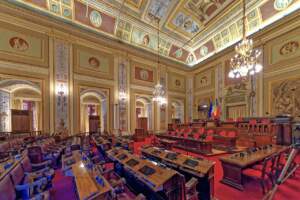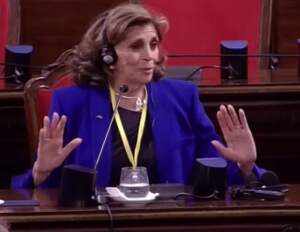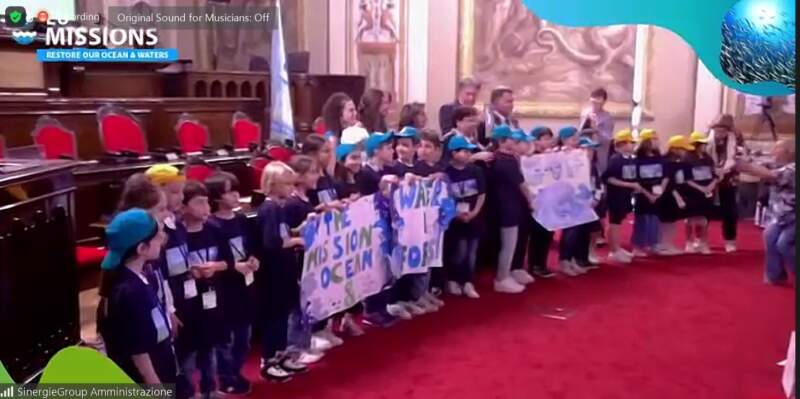 Palermo, Sicily, 30 and 31 May 2023. The regional Lighthouse Activities to recover the badly affected Mediterranean and Black seas brought together representatives of countries, regions, cities, islands, ports, fisheries, educational and research institutions and projects together into the regional parliament, Palazzo dei Normanni. The splendid Sala d’Ercole was certainly a prestigious venue in what used to be the royal palace of Frederic II with roots of Phoenician and Punic settlements retrieved in its foundations and today a Unesco World Heritage site in recognition of more than 2000 years of human and cultural exchange across the Mediterranean. With opening statements, among others, by Pascal Lamy, Chair of the Mission Board « Restore our Ocean and Waters », throughout these two days, the emphasis was on showcasing the political commitment of a wide array of stakeholders, united by their intentions to restore and better protect the Mediterranean. Several officials from Brussels listed the many funding programmes and the millions and millions of Euros to be had in pursuit of the recovery mission. As they say, money is the life blood of war, but it’s people and their organisations who make things happen. It was an impressive line up of speakers who illustrated, each one from their respective perspective, of local or central government, port authority, shipping represenatives or researchers from different fields, their perception of the challenges and what was already being done. Moderator Katrina Sichel needed all her skills and energy to keep this broad mix of people together for the full duration focused on the mission of restoring the seas to their former health. The classical seating arrangements with fixed rows of seats for the audience and an elevated stand and seating normally reserved for government and important speakers forced a cleavage that the programme tried to overcome. But the essential networking to make good use of the presence of so many different interest group representatives needed to take place outside, thus leaving many audience seats empty for long stretches.
Palermo, Sicily, 30 and 31 May 2023. The regional Lighthouse Activities to recover the badly affected Mediterranean and Black seas brought together representatives of countries, regions, cities, islands, ports, fisheries, educational and research institutions and projects together into the regional parliament, Palazzo dei Normanni. The splendid Sala d’Ercole was certainly a prestigious venue in what used to be the royal palace of Frederic II with roots of Phoenician and Punic settlements retrieved in its foundations and today a Unesco World Heritage site in recognition of more than 2000 years of human and cultural exchange across the Mediterranean. With opening statements, among others, by Pascal Lamy, Chair of the Mission Board « Restore our Ocean and Waters », throughout these two days, the emphasis was on showcasing the political commitment of a wide array of stakeholders, united by their intentions to restore and better protect the Mediterranean. Several officials from Brussels listed the many funding programmes and the millions and millions of Euros to be had in pursuit of the recovery mission. As they say, money is the life blood of war, but it’s people and their organisations who make things happen. It was an impressive line up of speakers who illustrated, each one from their respective perspective, of local or central government, port authority, shipping represenatives or researchers from different fields, their perception of the challenges and what was already being done. Moderator Katrina Sichel needed all her skills and energy to keep this broad mix of people together for the full duration focused on the mission of restoring the seas to their former health. The classical seating arrangements with fixed rows of seats for the audience and an elevated stand and seating normally reserved for government and important speakers forced a cleavage that the programme tried to overcome. But the essential networking to make good use of the presence of so many different interest group representatives needed to take place outside, thus leaving many audience seats empty for long stretches.
 The conference was at its liveliest, when civil society representatives gave examples of how they were addressing the excruciating pollution problem, e.g. showing the case of the Greek Island of Tilos which had taken on the profit logic of the waste industry – there was mention of a sector altogether worth €1 trillion/year. How did they do it? By focusing on human behaviour and incentive structures. Their credo was the belief that humans are not primarily about consumption, but to live good lives and enjoy. To do that they target zero waste in noxious landfill. They thus set up payment for avoided waste, recycling or upcycling as much as possible. When that initial phase seemed to reach its limit efforts on citizen education about waste kicked in. According to the report that reduced another 30% of the waste. It focused on buying less, wasting less and using food and other products better. Being transparent and accountable for the quantity and quality of waste brought the quantities down and generated a social consensus, in modern parlans a social licence to operate. At the time of conference nothing goes into landfill anymore and the remaining 13% is being incinerated as long as no other solution is being found. The unquestioned top stories were from three educational youth initiatives, particularly MAREVIVO presented by its incredibly energy radiating leader, Rosalba Giugni. She gave a firework of examples about how her organisation was engaging young people, schools and other civil society organisations over the last 35 years for ocean literacy and ocean protection. She insisted that the very youngest were in awe when learning about the ocean and marine organisms, but that a gaping void in the curriculum was a missed opportunity to build on that during higher classes. She thus emphasised the need for the forthcoming educational legislation to rectify this serious failure.
The conference was at its liveliest, when civil society representatives gave examples of how they were addressing the excruciating pollution problem, e.g. showing the case of the Greek Island of Tilos which had taken on the profit logic of the waste industry – there was mention of a sector altogether worth €1 trillion/year. How did they do it? By focusing on human behaviour and incentive structures. Their credo was the belief that humans are not primarily about consumption, but to live good lives and enjoy. To do that they target zero waste in noxious landfill. They thus set up payment for avoided waste, recycling or upcycling as much as possible. When that initial phase seemed to reach its limit efforts on citizen education about waste kicked in. According to the report that reduced another 30% of the waste. It focused on buying less, wasting less and using food and other products better. Being transparent and accountable for the quantity and quality of waste brought the quantities down and generated a social consensus, in modern parlans a social licence to operate. At the time of conference nothing goes into landfill anymore and the remaining 13% is being incinerated as long as no other solution is being found. The unquestioned top stories were from three educational youth initiatives, particularly MAREVIVO presented by its incredibly energy radiating leader, Rosalba Giugni. She gave a firework of examples about how her organisation was engaging young people, schools and other civil society organisations over the last 35 years for ocean literacy and ocean protection. She insisted that the very youngest were in awe when learning about the ocean and marine organisms, but that a gaping void in the curriculum was a missed opportunity to build on that during higher classes. She thus emphasised the need for the forthcoming educational legislation to rectify this serious failure.

School children trooping in at the end of the programme to remind the adults how important a healthy sea is for them
This high-level event was organised by the European Commission in close cooperation with the Italian government, the Sicily Region, and the University of Palermo, with the support of the BlueMissionMed Co-ordination and Support Action under Horizon 2020 Research Framework Programme. The programme with expected speakers is available here. Mundus maris attended online.
